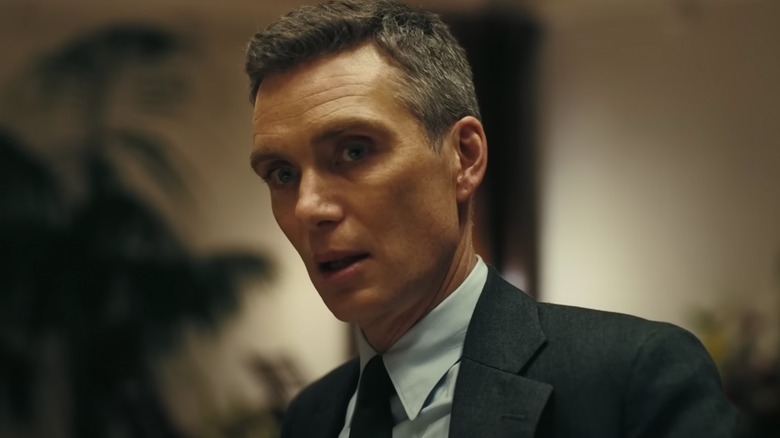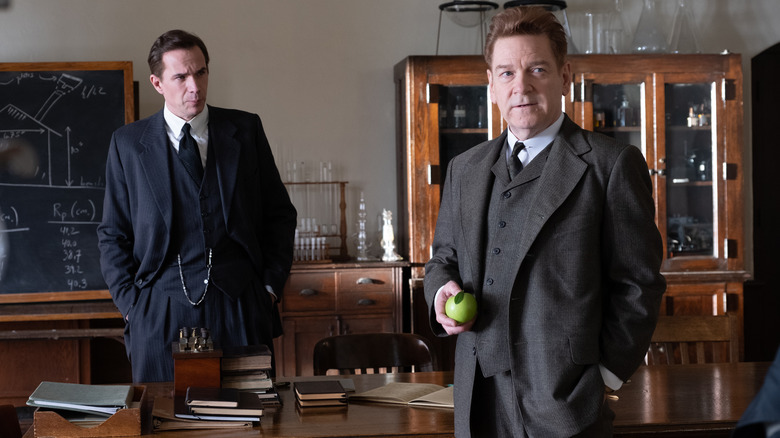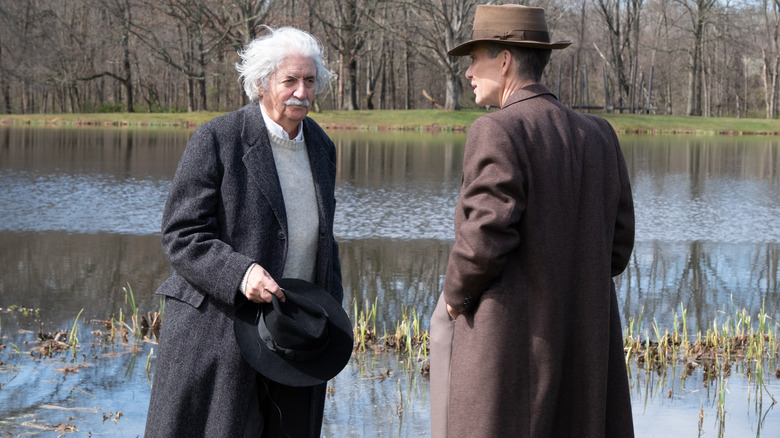J. Robert Oppenheimer's Real Grandson Isn't Happy About One Scene In Christopher Nolan's Film
Warning: This article contains spoilers for "Oppenheimer."
Despite what the loudest voices on social media might have you believe, the job of any biopic isn't necessarily to reenact history with complete accuracy — that's what textbooks and documentaries are for, after all. Rather, it's much more satisfying when it's about storytellers finding the emotional, humanizing truth at the core of figures whom we'll never truly know or understand. That's never stopped anyone from pointing out such historical errors and exaggerations anyway, of course, but do those complaints become more meaningful when the direct descendants of real-world figures are the ones voicing such thoughts?
Christopher Nolan's "Oppenheimer" is destined to land at or near the top of several "Best of" lists by the end of the year (check out Chris Evangelista's review for /Film here), but at least one member of J. Robert Oppenheimer's family has a certain misgiving about how a particular scene went down. TIME caught up with Charles Oppenheimer, the grandson of the world-famous scientist, in order to gather his insights on the movie and his grandfather's immensely complicated legacy. To his credit, Charles openly praises the film, even in spite of having initial reservations about how it would handle such subject matter:
"...I found myself accepting and liking it. I thought it told a compelling story and I could just take it as art that was really engaging. I was really happy to have that reaction. I didn't expect it."
However, that doesn't mean he had no issues with the story whatsoever. In fact, his trouble lies more with the book the film is based on, "American Prometheus: The Triumph and Tragedy of J. Robert Oppenheimer," as opposed to the film itself. Out of everything, one particularly apocryphal moment involving a poisoned apple stood out the most.
I am become death, poisoner of professors
How many times have you watched an historical drama and come to a scene that simply felt too dramatic or unbelievable to be true? With "Oppenheimer," many moviegoers received their first taste of the extraordinary lengths that J. Robert Oppenheimer went to in order to secure an atomic bomb for the United States before the Nazis developed their own, but that's not the sticking point that his grandson Charles has some reservations about.
In a scene taken straight out of "American Prometheus," Nolan stages a sequence where a young Oppenheimer, in attendance at Cambridge, lashes out at his stuffy professor Patrick Blackett, portrayed by James D'Arcy, for preventing him from attending a lecture by the acclaimed physicist Niels Bohr (Kenneth Branagh). In an extreme moment of vindictiveness, "Oppie" takes a syringe full of potassium cyanide and injects it in an apple left on Blackett's desk. Could this have really happened? For his part, Charles has his doubts:
"The part I like the least is this poison apple reference, which was a problem in 'American Prometheus.' If you read 'American Prometheus' carefully enough, the authors say, 'We don't really know if it happened.' There's no record of him trying to kill somebody. That's a really serious accusation and it's historical revision. There's not a single enemy or friend of Robert Oppenheimer who heard that during his life and considered it to be true. 'American Prometheus' got it from some references talking about a spring break trip, and all the original reporters of that story — there was only two, maybe three — reported that they didn't know what Robert Oppenheimer was talking about. Unfortunately, 'American Prometheus' summarizes that as Robert Oppenheimer tried to kill his teacher and then they [acknowledge that] maybe there's this doubt."
A game of telephone
Much of "Oppenheimer" is told from the subjective viewpoints of unreliable narrators, whether it be Oppenheimer himself and his terrifying visions/hallucinations or his political rival Lewis Strauss (Robert Downey, Jr.). But the poisoned apple is one instance that's depicted rather straightforwardly, with Oppenheimer even casually admitting what he did while talking to his lover Jean Tatlock (Florence Pugh). Yet even while insisting that there's no proof this ever happened, Charles Oppenheimer at least understands why Nolan saw the storytelling potential of this scene:
"Sometimes facts get dragged through a game of telephone. In the movie, it's treated vaguely and you don't really know what's going on unless you know this incredibly deep backstory. So it honestly didn't bother me. It bothers me that it was in the biography with that emphasis, not a disclaimer of, this is an unsubstantiated rumor that we want to put in our book to make it interesting. But I like some of the dramatization. I thought Einstein's conversation with Oppenheimer at the end was really effective even though it wasn't historical."
Setting aside the irony of attempting to clear up one supposed murder attempt by the man responsible for creating the weapon of mass destruction that's confirmed to have killed hundreds of thousands of innocents at the end of World War II, it's only reasonable that Oppenheimer's family would feel protective of how he's depicted on-screen. The full interview with TIME is well worth reading in its entirety, particularly for the tidbit on whether Oppenheimer would've ever cursed in real life. No, you're not the only one amused by how well this fits that "Community" meme: I can excuse mass murder and war crimes, but I draw the line at cursing and poisoned apples.
"Oppenheimer" is currently playing in theaters.


